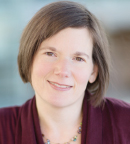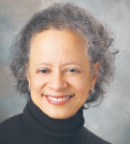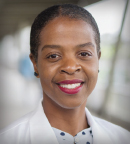“Of all the forms of inequality, injustice in health is the most shocking and the most inhumane because it often results in physical death. I see no alternative to direct action and creative nonviolence to raise the conscience of the nation.”
—Martin Luther King, Jr, speaking before the Medical Committee of Human Rights,
March 25, 1966
For the past few months, I’ve had the sensation of both being flooded by waves and being adrift in an ocean. First came the COVID-19 pandemic, which has devastated all American communities but none as acutely as communities of color in terms of job loss, deprivation, and mortality. Almost simultaneously, the successive highly public killings of Ahmaud Arbery, Breonna Taylor, and George Floyd, and the widespread public outcry their deaths have triggered, are washing over us. These waves have hit with sudden, destructive, and overwhelming force, washing away comforting assumptions by some of us regarding progress toward racial equity, and reinforcing the anger, frustration, and hopelessness that others feel in wondering whether the status quo will ever change, and whether the struggle to remain above water will ever ease.

Katherine Reeder-Hayes, MD, MBA, MSc
As a researcher of health disparities, and a white American who tries to serve as a physician, colleague, friend, and ally for black Americans, I am also aware that these waves exist on the surface of a larger ocean, one that surrounds us every day. In the context of our work in cancer, this ocean includes the entrenched disparities in cancer incidence, treatment, and mortality that plague every treatable type of the disease, arising in most cases not from biologic differences but from a health-care system that consistently discriminates against patients of color in access to and quality of care.
In the larger area outside our home waters, the ocean includes a system of aggressive policing, mass incarceration, broken justice, and violence against black and brown people that stretches across our country’s history, as well as an even larger context of racism within our education, housing, and employment systems that persistently and effectively crushes opportunity and perpetuates segregation and socioeconomic disadvantage for communities of color. Depending on our cultural, racial, and ethnic backgrounds, we may have lived in constant awareness of this ocean, or we may be waking up to them only recently. Either way, they seem endless, immense, and beyond our control.
As a white physician serving diverse patients in a diverse workplace, I fear being misinterpreted, causing more hurt with my clumsy words, or forcing entry to an area of someone’s life that might be considered none of my business. But while social distancing may be protective during the storm of COVID-19, it will be devastating in a storm of racial division.
In trying to navigate these waters, I (KR-H) have relied on conversation with wise and generous colleagues—Drs. Lori Pierce, Manali Patel, and Marjory Charlot—researchers in racial disparities, ASCO leaders, and oncologists who have helped me shape my own thoughts and understand theirs in turn. We now share these thoughts with the oncology community, in the hopes they may trigger both conversations and, more importantly, meaningful action.

Lori J. Pierce, MD, FASTRO, FASCO

Manali I. Patel, MD, MPH

Marjory Charlot, MD, MPH, MSc
First Steps: Six Ways the Oncology Community Can Discuss and Promote Racial Equity
1: Acknowledge Our Positions of Privilege and Influence
Whatever our backgrounds, most medical providers in our country enjoy comfortable economic circumstances and are highly educated. It is a simple fact that compared to our patients, and to the front-line health-care workers who serve alongside us daily, we occupy positions of cultural privilege. These privileges vary from one individual to another; some of us also come from advantaged racial, ethnic, and socioeconomic groups and have enjoyed far easier paths of education, training, and professional advancement than others as a result of those identities.
None of us can change the complex identities previously assigned to us, nor should we. However, to ignore our privilege—to not reflect on what our privileges are, consider how they’ve shaped our professional experience, or realize how they may limit our understanding of others’ experience—is to persist in willful ignorance. Further, a failure to identify where we enjoy influence and power is a missed opportunity to effect change and be useful.
We would not accept a colleague’s refusal to monitor her surgical complication rates, consider how new research findings impact his prior assumptions, or hear feedback about how her teaching style has impacted trainees. Failing to hone our medical skills and place them in context, or failure to employ our training for the common good, makes us obsolete and, in the end, dangerous. In the same way, to be effective advocates for racial equity in cancer care, we must first understand how we arrived at our current positions, as well as where we hold positions of influence that can be used for the benefit of others.
2: Acknowledge Our Discomfort and Limitations
Medical providers often struggle to face failures and limitations. We stay up too late, work too many hours, or fail to take time for self-care, to the detriment of our health. We look forward to case presentations with a heroic outcome, but struggle when things go badly with a patient.
Unfortunately, discussions about race and racism in cancer care may most closely resemble a “morbidity and mortality” conference. It is important, as we seek to do better in the future, to think deliberately and reflectively on our discomforts. As providers, those of us who are not part of a marginalized group may feel embarrassment that we have been disengaged, fear that speaking up may provoke an angry response or hurt us professionally, anxiety about others’ reactions, or discomfort with how ill-prepared we feel. Providers from marginalized groups might feel frustration that conversations have not occurred earlier, exhaustion with the sudden desire of many to engage us, or hurt that others know so little about issues that affect our community.
If we feel uncomfortable talking about race and racism in the workplace, we probably have lots of company. We will be more successful after a pause to reflect on the sources of our discomfort. After this pause, we can open the door of conversation.
3: Start a Conversation With Our Patients
We believe there is no single right way to begin this dialogue, but all medical providers have a responsibility to do so. For most of us, addressing racial topics with patients will certainly feel awkward or may make us uncomfortable, just as our first experience taking a medical history or performing a physical exam felt awkward because we were practicing a new skill for the first time. Fortunately, we now enter most of those interactions with greater ease, due to long experience.
Providers can begin by simply asking patients how recent episodes of racial violence and protests against racial injustice are affecting their and their loved ones’ lives. This inquiry is appropriate regardless of the race or ethnicity of the provider or patient; we should not assume we know who feels threatened, aggrieved, or traumatized by recent events. As with any sensitive topic, we need to take our hands off the keyboard, adopt a listening posture, and offer supportive responses to what is said. We also need to match the inquiry to our level of prior relationship and trust, and to be alert for cues that a patient does not want to talk.
It will likely be appropriate to express our own feelings of sorrow, anger, or helplessness, but only after the patient has had a chance to tell us about his or her experience. For our patients, this may be a rare opportunity for them to take on a role of teaching and educating their medical provider, particularly if we explicitly say we are trying to learn and understand more about others’ experiences so we can support our patients more effectively.
As our relationships with patients grow, we should regularly practice obtaining a social history, which helps us understand how the social determinants of health—their economic, social, educational, and neighborhood context—may impact each patient. This is a central facet of good patient care, now and always, and can open the door to deeper conversations.
4: Start a Conversation With Our Colleagues
We believe that despite the stormy seas, we are living through a unique time when change is in the air, and we can and should use the present circumstances to listen and learn from one another in the oncology community. We must go about this process with an unusual blend of boldness and sensitivity. With regard to racism against black Americans, we cannot expect black colleagues to take on the responsibility of educating their non-black peers with regard to issues of diversity and equity either inside or outside our field. We must also be sensitive to the emotional toll of workplace conversations on colleagues from marginalized groups, who may already be processing intense feelings of anger, fear, grief, and vulnerability at this time.
However, we cannot miss this moment of opportunity where colleagues of different racial backgrounds may feel more urgency, or more permission, to engage with each other in conversation and partner to develop action plans. Further, lack of conversation may send a dangerous message, particularly to colleagues of color, that it’s “business as usual” in the department or that their workplace community is unconcerned with events that impact them deeply.
As with our patients, first-time efforts at conversation about race and racism among diverse colleagues likely will feel awkward or uncomfortable. For all involved, asking questions, listening carefully, and expressing humility and a desire to learn will be helpful. Leaders of oncology organizations may contribute by providing safe spaces for discussion and dialogue. In our current context, this leadership must include the creation of appropriately facilitated online spaces, which may require learning new technologies.
For those of us who are not black, we must take on the additional responsibility, if we have not done so before, to educate ourselves about black history and structural racism generally and as they apply to our profession. Many excellent resources exist, and the entry points to learn more about race and racism are abundant via our individual expertise in medical education, cancer prevention, the justice system, health policy, and many other areas.
One good starting point is to learn more about an area you are already passionate or somewhat knowledgeable about, but through a racial equity lens. The National Museum of African American History and Culture (https://nmaahc.si.edu/explore/nmaahc-digital-resources-guide) and other history museums offer rich digital materials for self-education. For those in academic settings, most universities have offices of diversity, equity, and inclusion, which offer opportunities for both training and becoming involved in mentorship. Community training in antiracism, implicit bias training, or campus events for those in an academic setting are other entry points for learning. These educational opportunities may be of greater value in beginning workplace conversations if we take an additional step and ask a colleague to attend with us. Taking such steps together can build solidarity among diverse colleagues.
ASCO supports an active Health Equity Committee, as well as task forces devoted to workforce diversity and other issues related to equity and inclusivity. Other national physician organizations, including the American College of Physicians and many others, as well as several cooperative research groups, have committees focused on health disparities.
5: Take Action in Our Spheres of Influence and Beyond
Oncology professionals are influential members of an enormous range of communities, from teaching hospitals and training programs, to our daily practice environments, to administrative groups that make institutional decisions, to positions as advisors of local, state, and federal government. As members of ASCO, we also represent collectively the most powerful voice of the oncology community in many national discussions.
Although the right action for each individual ASCO member will look different, we all have opportunities to reflect on our own spheres of influence and take appropriate actions. Who is comfortable in this space, and who does not feel included? What structures or policies in an organization hinder equity? What could be changed to ensure that all patients (trainees, employees, or department members) are treated with equal dignity, respect, and quality? What could I do to ensure that my own teams are more diverse and inclusive of people of color? How is my institution doing on enrolling patients of color to clinical trials?
Once we become aware of racial inequity within our own sphere of influence, we are obligated not only by our social contracts as members of society, but above all by our oath as physicians to “first do no harm,” to do all within our power to change that inequity.
A number of actions are already underway at ASCO to advance racial equity in the field of cancer care. Dr Pierce’s theme as ASCO President, “Equity: Every Patient. Every Day. Everywhere,” will be supported and advanced by the strategic planning initiative underway by the Health Equity Committee and by specific emphases on building cultural competency and providing education regarding the social determinants of health among ASCO members. These efforts align with, and in fact are integral to, ASCO’s mission to conquer cancer through research, education, and promotion of the highest-quality patient care.
6: Impact the Next Generation
The medical field has a long history of training the next generation using on-the-ground experiences of mentorship with older generations. Our medical education system, beyond the classroom years, is essentially one of apprenticeship. Although this system is itself filled with barriers and inequities, it offers oncologists a myriad of opportunities for right action in the field of racial justice.
The oncology field currently has one of the lowest representations of people of color among all medical subspecialties. To encourage a more diverse workforce of oncologists, practitioners can open their practices to rotating students and can specifically partner with medical schools that serve diverse students. Academic physicians can volunteer with pipeline programs at their universities that expose undergraduates and medical students from underrepresented minority groups to oncology practice. Those who hire student research assistants or postdoctoral trainees, select fellowship candidates, or take on trainees in their research program can commit to inclusion of a diverse population of trainees.
Further, we can learn to better support our trainees of color, who often face particular challenges and barriers to completing training, first by humbly asking about their experiences, and then by becoming advocates and allies as they begin to build their careers. Those who occupy institutional and national leadership positions in medical education can push for equity in the selection and evaluation of fellows, as well as training in cultural competency and the social determinants of health for all trainees, to ensure they are equipped to care for a diverse population of patients and to continue the fight for equity in cancer care into the next generation. We owe this duty to our field, and to our patients: to leave the profession stronger—and more just—than we found it.
Dr. Reeder-Hayes is Assistant Professor of Medicine at University of North Carolina (UNC)–Lineberger Comprehensive Cancer Center, Chapel Hill, North Carolina. She is the current Chair of ASCO’s Health Equity Committee. Dr. Pierce is the 2020–2021 ASCO President; Vice Provost for Academic and Faculty Affairs at the University of Michigan, Ann Arbor; and Director of the Michigan Radiation Oncology Quality Consortium. Dr. Patel is Assistant Professor of Medicine in the Division of Medicine and the Center for Health Policy/Primary Care Outcomes Research at Stanford University School of Medicine; she is also with the Palo Alto Veterans Affairs Health Care System in Palo Alto, California. Dr. Charlot is Assistant Professor of Medicine at UNC School of Medicine.
DISCLOSURE: Drs. Reeder-Hayes, Pierce, and Charlot reported no conflicts of interest. Dr. Patel has served as a consultant to Celgene and Pacific Business Group on Health.

